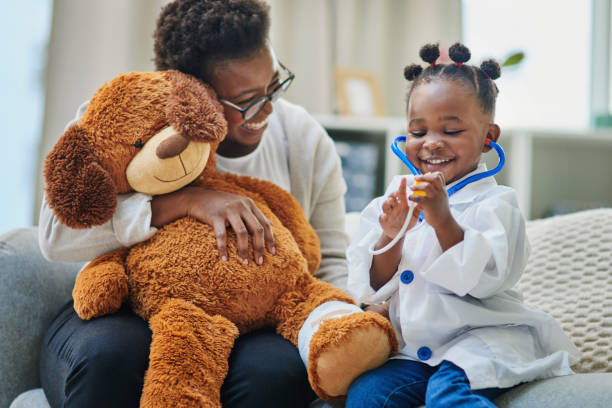
Can you tell whether your kid has a fear of doctors by how they act? Here are some tips for making doctor appointments easier for your children.
Go With Your Child
Even while we may sometimes require a grandmother or other carer to accompany our kid to the doctor, Parents' expert and author of the Baby 411 book series, Dr. Ari Brown, recommends that parents make the first appointment or two whenever possible.
She argues that children are more at ease during medical appointments when they witness their parents relaxed and trusting of the doctors in the unfamiliar place.
Make It A Game At Home
Get your kid used to a play medical set before taking them in for an actual checkup. Use a book like Corduroy Goes to the Doctor or Doc McStuffins' Doctor Bag to help him her rounderstand what will happen.
Listen to a stuffed animal's breath with a toy stethoscope, or have your child practice saying "aah". Try saying something like, "We're searching for boo-boos," which they'll understand, but be sure to use the correct terms for the equipment being used so that he or she doesn't feel uncomfortable.
RELATED: Everything You Need to Know About Your First Well-Child Visit
Try A Positive Spin
An excessive amount of advance warning might induce unnecessary anxiety. As you're traveling to work or first thing in the morning of their appointment, break the news to them. It's my treat to see your physician. They ensure your well-being and strength.
If your young child asks if they will be getting a shot, you should tell them the truth. Tell them that if they require a shot, they should expect to feel a pinch in their arm for a few seconds.
Tell them to give you a tight grip and that the injection will give them "superpowers" to fight against diseases. Discuss the positive aspects of the visit, such as getting stickers or a little item, or your plans for the remainder of the time, such as going to the playground afterward
Time It Right
Your youngster will behave better at the doctor's office if he or she has eaten and slept before the appointment. Considering the unpredictability of the wait time, be sure to bring healthy snacks, kid-friendly games, crayons, and your child's favorite stuffed animal (and steer them away from the germ-covered waiting-room toys).
You can keep them happy and interested by asking them about the framed artwork or fish in the aquarium.
Stay Close By If They Need You
Doctors and nurses are used to doing most of an examination on a child while holding them in a caregiver's arms and are only somewhat uncomfortable doing so.
In the physician's presence, a little child may feel especially defenseless while lying on the exam table. Let her feel secure and protected by sitting on your lap.
Keep Them Calm
Provide your child with a choice. Check his or her pulse in whatever arm or chair they prefer. In order for your youngster to watch a process, the doctor may do a trial run on their stuffed animal.
You may help your youngster cope with immunizations by stimulating their senses. Sucking on something tasty, listening to a favorite song, or looking at interesting objects (such as bubbles or a glittering wand) are all proven methods for diverting their attention.
Get your kid to take a few deep breaths with you. If you do this, they'll feel at ease, their heart rate will slow, and you'll have a good rapport.
Bring A Favorite Stuffed Animal Or Toy
The doctor may be able to do a "practice exam" on your child if they are calmed with a stuffed animal or doll instead of a pacifier or blanket. There is nothing to worry about since there is nothing scary that your child will witness.
If you have older siblings who aren't afraid of doctors, ask if it's okay if you go to the doctor for a checkup first. Having an older sibling go first may help kids overcome their fears and take the plunge.
Offer A Reward
Your reaction after each doctor's visit might help shape your future appointments. Dr. Shifrin recommends sending patients home with reassurances like "You did so great, I can't wait to tell Grandma or Daddy how brave you were" and a hug and kiss.
Also, you may take kids to a movie or a playground. If your child has trouble calming their nerves, they may miss out on the incentive and feel bad about it. Do not forget to highlight the bright side of events.
Trust Your Instincts
Finding a doctor who is a good fit both emotionally and intellectually is essential. Some children will be nervous about seeing any doctor, but if yours seems to be really worried, you should probably find out why and talk to other parents who use the same physician. If your child's fears are justified, it may be time to look for a different pediatrician.








